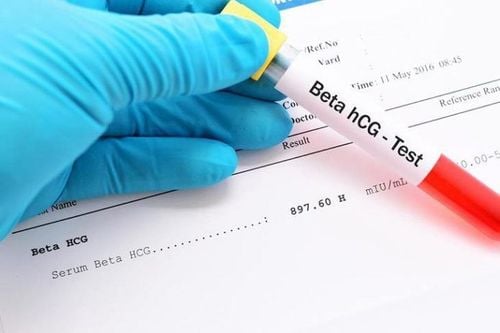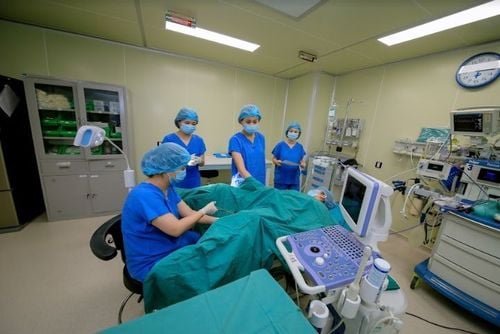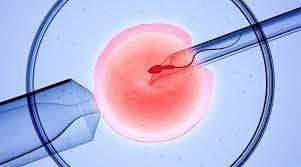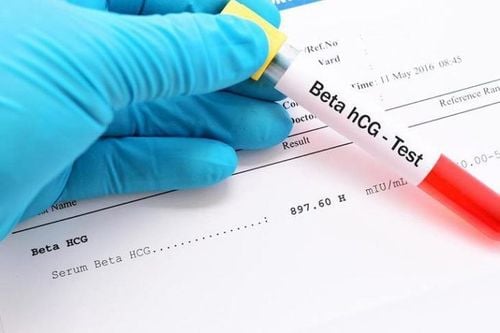This is an automatically translated article.
IVF is a common method of choice for infertility treatment. Beta hCG test 14 days after embryo transfer is very important to help determine whether the conception is successful or not.
1. In vitro fertilization
In vitro fertilization is a fertility treatment method in which fertilization takes place in a test tube, after the embryo is formed, it will be transferred to the woman's uterus for further development.
In vitro fertilization usually goes through the following steps:
Examination and assessment of the couple's reproductive health status. The wife will have sex hormone quantitative tests, blood tests to check for infectious diseases and gynecological ultrasound. Meanwhile, the husband will do tests to assess sperm quality and test for infections. The wife will be given ovarian stimulation injections for 9-11 days. The process of ovarian stimulation needs to be closely monitored to determine the right time to inject ovulation. After 36-40 hours of ovulation induction, the wife will be anesthetized to collect the eggs while the husband will have the sperm collected. Eggs and sperm will be fertilized in vitro to create embryos. This culture usually takes place 2-5 days before the embryo is transferred to the wife's uterus. Insemination process can yield many quality embryos, some embryos will be transferred to the uterus, some embryos will be frozen for use in future embryo transfers. Embryo transfer: As a very important step in the fertilization process, the doctor will transfer embryos when the uterine lining has enough thickness and good quality, favorable for development when the embryo is placed in the uterus. Perform beta hcg test 14 days after embryo transfer. Monitor pregnancy if fertilization is successful.
2. Beta hCG test after 14 days of embryo transfer

Nồng độ hCG ở người bình thường < 5 mUI/ml, ở phụ nữ có thai > 25 mUI/ml
The concentration of hCG in normal people is < 5 mUI/ml, in pregnant women > 25 mUI/ml, if the concentration is in the range of 6-24 mUI/ml, the pregnancy status is unknown, need to do more testing and follow-up for identification. The level of hCG is often lower than normal pregnancy in cases of miscarriage, fetal growth arrest, ectopic pregnancy. High levels of hCG in the cases of women carrying multiple pregnancies, ovulatory pregnancies, ectopic pregnancies,...
2.2. The role of beta hCG test after 14 days of embryo transfer Normally after 14 days of embryo transfer, the wife will go to the hospital to check the beta hCG level, if the beta hCG level is higher than 25mUI/ml, it means that she is pregnant. Because hCG levels increase so rapidly in early pregnancy, normally hCG levels double every 48-72 hours, so if after two days the beta hCG level increases about 1.5 times or more compared to The first time shows that the fetus is developing.
If the beta hCG levels rise and fall, accompanied by abnormal signs such as persistent abdominal pain, vaginal bleeding, etc., the embryo may be regressing and the ability to keep the pregnancy is low. However, if it is actively managed by doctors and after 48 hours of re-testing, the hCG levels increase at least twice, there is still hope to keep the pregnancy.
If the beta hCG test results after 14 days of embryo transfer are higher than normal, then there is a possibility of multiple pregnancy, but during the nursing period, wait for ultrasound, if there are signs such as vaginal bleeding With abdominal pain, it is necessary to visit the hospital promptly to rule out the possibility of an ectopic pregnancy.
If the test results of hCG levels after 2 days do not increase or decrease, it is necessary to continue monitoring. If the hCG level falls to < 5mUI/ml, a miscarriage has occurred. In this case, the frozen embryos will be transferred to the uterus in subsequent cycles.
After the embryos have been successfully implanted in the uterus, pregnant women need to spend a lot of time resting, eating well, exercising appropriately and especially having ultrasound and regular antenatal check-ups according to the schedule. Make an appointment with your doctor to make sure the pregnancy is safe.

Trung tâm hỗ trợ sinh sản IVF Vinmec đã hỗ trợ sinh sản cho hơn rất nhiều cặp vợ chồng hiếm muộn với tỷ lệ thành công trên 40%
Vinmec IVF Reproductive Center was established in November 2014 with a system of modern facilities and a team of highly qualified experts including professors, doctors, doctors at home and abroad. Up to now, the center has assisted reproduction for more than 1000 infertile couples across Vietnam with a success rate of 45%-50%, this success rate is equivalent to developed countries such as the US, UK, Australia,..
Please dial HOTLINE for more information or register for an appointment HERE. Download MyVinmec app to make appointments faster and to manage your bookings easily.













